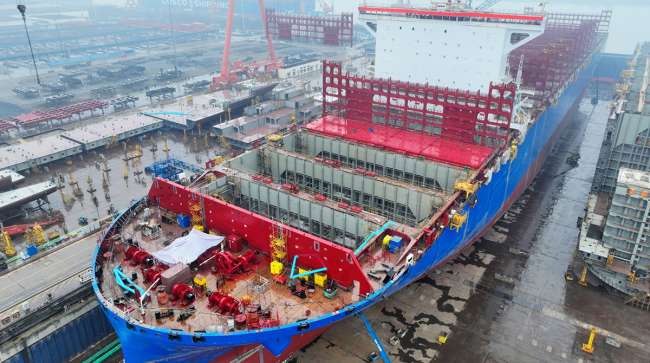Biden Eyes Chinese Shipbuilding Subsidies as Tensions Simmer

[Stay on top of transportation news: Get TTNews in your inbox.]
President Joe Biden pledged to look into a petition from a group of unions asking his administration to review China’s subsidies for shipbuilders, as tensions between the world’s two largest economies simmer on trade and key supply chains during a critical American election year.
U.S. Trade Representative Katherine Tai “will take a hard look at this petition in accordance with the law,” Biden said March 13 in a post on X. “We’ll always stand against China’s unfair practices — and as long as I am president, I’ll fight for U.S. workers and jobs.”
Shipbuilding is emerging as the latest battleground in the U.S.-China trade war, which has ensnared products ranging from solar panels and semiconductors to electric cars. While strains eased late last year after a meeting between Biden and Chinese President Xi Jinping that resulted in some agreements to better manage potential flare-ups, the two sides remain at odds over areas of strategic economic and military importance.
Tai referenced Washington’s concerns about risks to global supply chains in a separate statement citing China’s “acts, policies and practices” in shipbuilding, maritime business and logistics. The Asian nation has created “dependencies and vulnerabilities” in steel, aluminum, solar, battery and critical mineral sectors, she said.
Today, a group of unions led by USW filed a petition on shipbuilding.
We’ll always stand against China’s unfair practices — and as long as I am president, I’ll fight for U.S. workers and jobs.@USTradeRep will take a hard look at this petition in accordance with the law. https://t.co/PBVVK1XD5M — President Biden (@POTUS) March 12, 2024
China’s Ministry of Commerce did not immediately respond to a faxed request for comment March 13.
Shares of Chinese shipbuilders dropped after Biden’s announcement, with China CSSC Holdings Ltd. — a subsidiary of the China State Shipbuilding Corp. — falling as much as 3.3% in Shanghai. Markets across Asia were broadly lower during the trading day.
A coalition of five U.S. unions — the United Steelworkers, the AFL-CIO Maritime Trades Department, International Association of Machinists and Aerospace Workers, the International Brotherhood of Boilermakers and the International Brotherhood of Electrical Workers — filed the petition in a bid to urge action on what it called Beijing’s “nonmarket policies” to dominate the commercial shipbuilding industry.
“If we do not act quickly, we will soon be dependent on China not only for the products their vessels bring into our ports but also for the ships themselves,” USW International President David McCall said in a statement.
The petition — and Biden’s response — also came as former President Donald Trump clinched the Republican presidential nomination, setting up a rematch with his Democratic rival in November’s general election. Trump has vowed to increase tariffs on Chinese imports if elected for a second term, and has privately floated levies as high as 60% on Chinese goods.
🚢 Missed today’s announcement? This video will fill you in on our work to revive the commercial shipbuilding industry: https://t.co/OV1BOKntcm — United Steelworkers #EverybodysUnion (@steelworkers) March 12, 2024
“We will see trade with China as a point of contention right up to the elections,” said Dylan Loh, assistant professor of politics at Nanyang Technological University in Singapore, who specializes in China’s international relations. The flurry of actions from the Biden administration shows that “neither he nor Trump can afford to look weak on China.”
China already dominates the global shipbuilding industry, having in 2019 merged its two biggest shipmakers to create a state-owned industrial and military behemoth that dwarfs international rivals.
That support helped it to surpass previous global leaders South Korea and Japan. In 2022, Chinese yards constructed almost half the gross tonnage of merchant ships built that year, according to United Nations data. That size has allowed the nation to quickly expand its merchant and military fleets with about 400 vessels, giving it the world’s largest navy.
In a statement published in the state-owned Economic Daily newspaper last week, the director of a CSSC-linked research institute said the country should consolidate its leading role in the global shipbuilding sector.
“We must focus on filling in the gaps in materials for building high-tech ships,” Wang Qihong said, according to the newspaper.
The @steelworkers @MachinistsUnion @boilermakernews @IBEW and Maritime Trades Department are petitioning the U.S. Trade Representative to take action against unfair and anti-competitive shipbuilding practices in China that hurt American maritime workers.https://t.co/ikuhjj8Y7Y — Maritime Trades Department, AFL-CIO (@Maritime_Trades) March 12, 2024
The U.S., meanwhile, is struggling to repair the naval fleet it has, and is in talks with Japan to use that nation’s shipyards to do repair and maintenance on military vessels. That deal may be signed at a summit in the U.S. next month.
The USW pointed to U.S. job losses resulting from the closure of shipyards as a key concern, and stressed in its statement potential national security implications from becoming too reliant on China for shipping.
Rebuilding the U.S. Merchant Marine — the organization making up hundreds of civilian and federally owned mariners and merchant vessels — “will help shore up the critical supply chains our military and commercial shipbuilding industries share, making us safer and more resilient,” McCall said.
Want more news? Listen to today's daily briefing above or go here for more info
Amid growing concerns that hackers could roil crucial supply chains, Biden last month said he would sign an executive order designed to implement new cybersecurity requirements for the nation’s port owners and operators.
Washington is pushing allies including the Netherlands, Germany, South Korea and Japan to further tighten restrictions on China’s access to semiconductor technology. Commerce Secretary Gina Raimondo on March 11 signaled the U.S. may intensify its campaign on China curbs, saying the government “will do whatever it takes to protect our people, including expanding our controls.”
Biden has also said he would sign a bill in the U.S. House of Representatives that would force TikTok’s Chinese owners to sell the app due to national security concerns. The U.S. intends to investigate potential data and cybersecurity risks posed by Chinese electric vehicles and other internet-connected cars.




